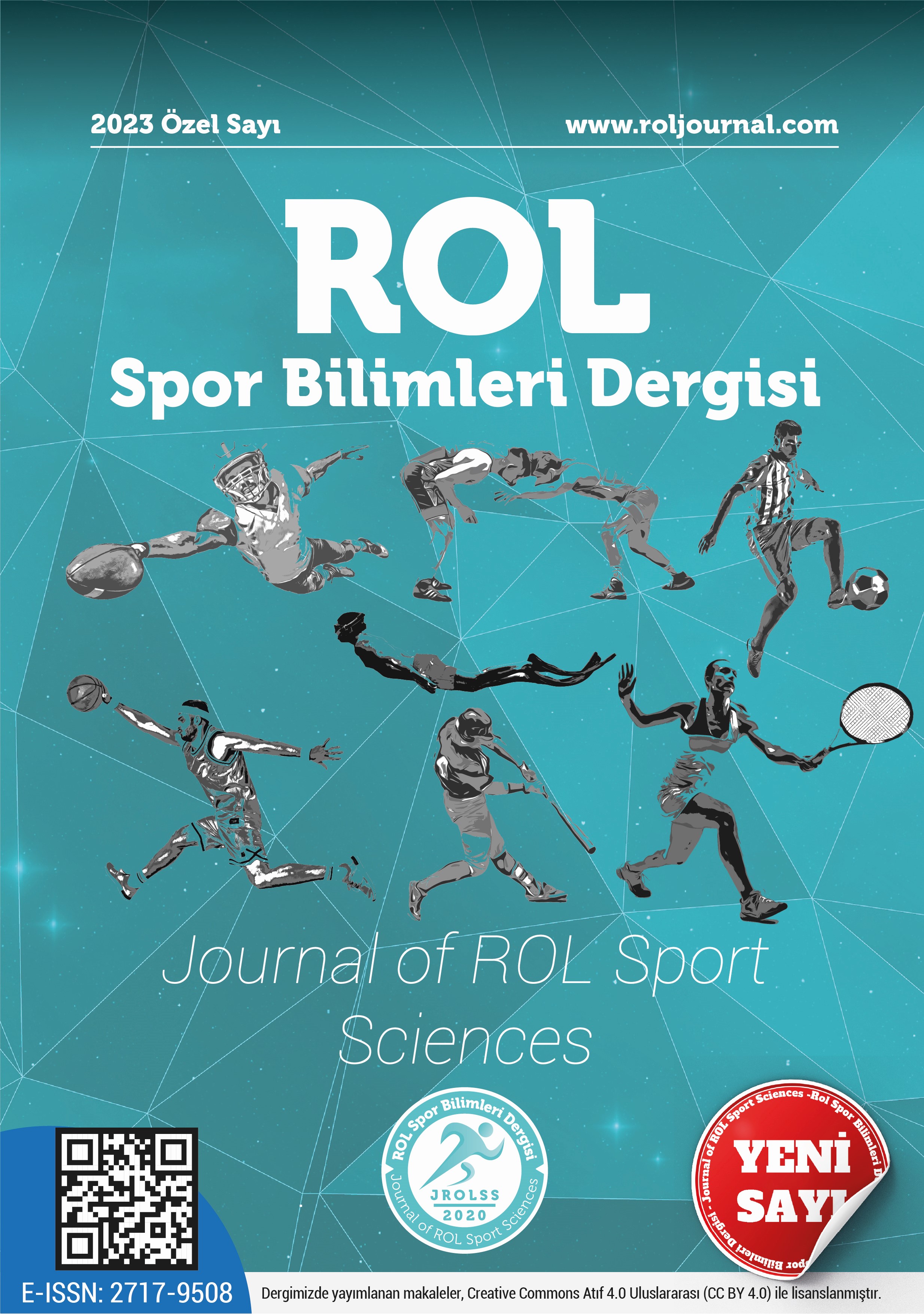Determination of factors affecting the development processes of active fencing referees in Turkey
DOI:
https://doi.org/10.5281/zenodo.10025025Keywords:
Fencing, referee, referee development, factors affecting refereesAbstract
The objective of this study is to determine and interpret the opinions of the fencing referees who are actively involved in the competitions in our country on the issues affecting their development processes. The study group; The Turkish Fencing Federation consists of 80 referees who are on the list of referees with a visa for 2021. An online data collection form was used as a data collection tool in this study, which was structured through the qualitative research method. In the analysis process of the data obtained, the data analysis program called MAXQDA Analyctis Pro (2022) was used. While closed-ended questions were summarized by indicating percentages, the content analysis method was used in the process of analyzing open-ended question and answer reports. The data obtained were visualized with the help of frequency tables and code maps. Finally, some of the opinions of the participants, which were coded, were directly conveyed by interpreting the findings obtained through the tables and code maps. As a result of the research, negative and positive views that affect the development processes of fencing referees in Turkey were categorized. While the issues such as training and development seminars organized for referees, increasing the number of referees' duties, meeting the accommodation and meal expenses of the referees, and improving their wages are among the positive factors; Factors such as the excessive working hours of the referees, the pressure of the coaches and athletes, the low wages, and the lack of sufficient job opportunities were evaluated within the scope of negative effects.
References
Ahmed, H., Davison, G., & Dixon, D. (2017). Analysis of activity patterns, physiological demands and decision-making performance of elite Futsal referees during matches. International Journal of Performance Analysis in Sport, 17(5), 737-751.
Al-Haddad, N. H., Al-Taie, D. N., & Kzar, M. H. (2022). The knowledge outcome of the fencing law among the referees, coaches and players of some arab countries. Revista Iberoamericana De Psicología Del Ejercicio Y El Deporte, 17(3), 133-136.
Arı, A., & Öz, N. D. (2023). Investigation of social capital, empathy and individual responsibility parameters in dual career athletes: an exploratory study. Physical Education of Students, 27(2), 89-96.
Avugos, S., Macmahon, C., Bar-Eli, M., & Raab, M. (2021). Inter-individual differences in sport refereeing: A review of theory and practice. Psychology of Sport and Exercise, (55), 101926.
Barsbuğa, Y., Bacak, İ., & Sariipek, T. (2020). A Scrutiny on the burnout levels of fencing referees. Turkish Journal of Sport and Exercise, 22(3), 389-394.
Cuskel, L. G., & Hoye, R. (2013). Sport officials’ intention to continue. Sport Management Review, 16(4), 451–464.
Dawson, P., & Dobson, S. (2010). The influence of social pressure and nationality on individual decisions: Evidence from the behaviour of referees. Journal of Economic Psychology, 31(2), 181-191.
Ganakas, E., & Peden, A. E. (2023). Exploring why young Australians participate in the sport of fencing: Future avenues for sports‐based health promotion. Health Promotion Journal of Australia, 34(1), 48-59.
Giel, T., & Breuer, C. (2020). The determinants of the intention to continue voluntary football refereeing. Sport Management Review, 23(2), 242-255
Hemmat, D. M. M. (2022). Attitudes of players and referees towards video assistant referee (var) at an aiding tool in fencing. International Journal of Sports Science and Arts, 21(1), 69-88.
Jacobs, B. L., Tingle, J. K., Oja, B. D., & Smith, M. A. (2020). Exploring referee abuse through the lens of the collegiate rugby coach. Sport Management Review, 23(1), 39–51.
Kim, M., Kim, H. S., Simmond, A., & Warner, S. (2022). Strengthening referees’ psychological well-being through engagement and authenticity. Sport Management Review, 25(2), 254-274.
McDow, B. (2009). Future trends of fencing in the USA [Doctoral dissertation, University of Kansas].
Mo, J. (2022). Allez Go: Computer vision and audio analysis for ai fencing referees. Journal of Student Research, 11(4).
Ridinger, L. L., Kim, K. R., Warner, S., & Tingle, J. K. (2017). Development of the referee retention scale. Journal of Sport Management, 31(5), 514–527.
Ültay, E., Akyurt, H., & Ültay, N. (2021). Descriptive content analysis in social sciences. IBAD Journal of Social Sciences, (10), 188- 201.
Wicker, P., & Frick, B. (2016). Recruitment and retention of referees in nonprofit sport organizations: The trickle-down effect of role models. Voluntas, 27(3), 1304–1322.
Downloads
Published
How to Cite
Issue
Section
License
Copyright (c) 2023 Journal of ROL Sport Sciences

This work is licensed under a Creative Commons Attribution 4.0 International License.

